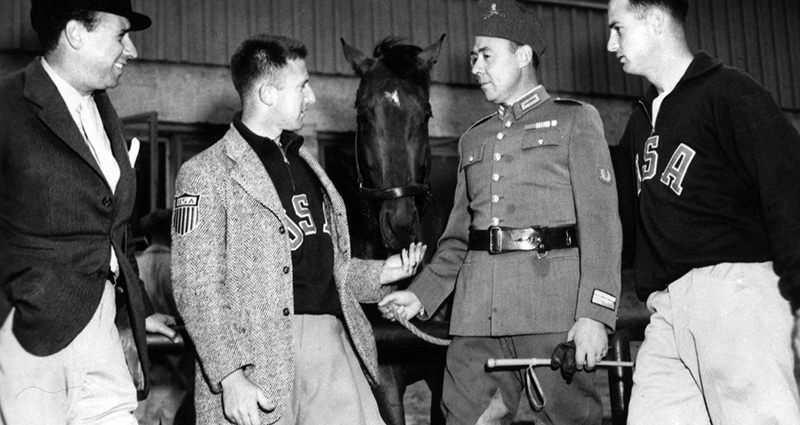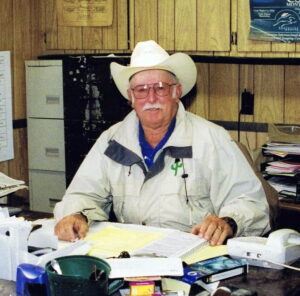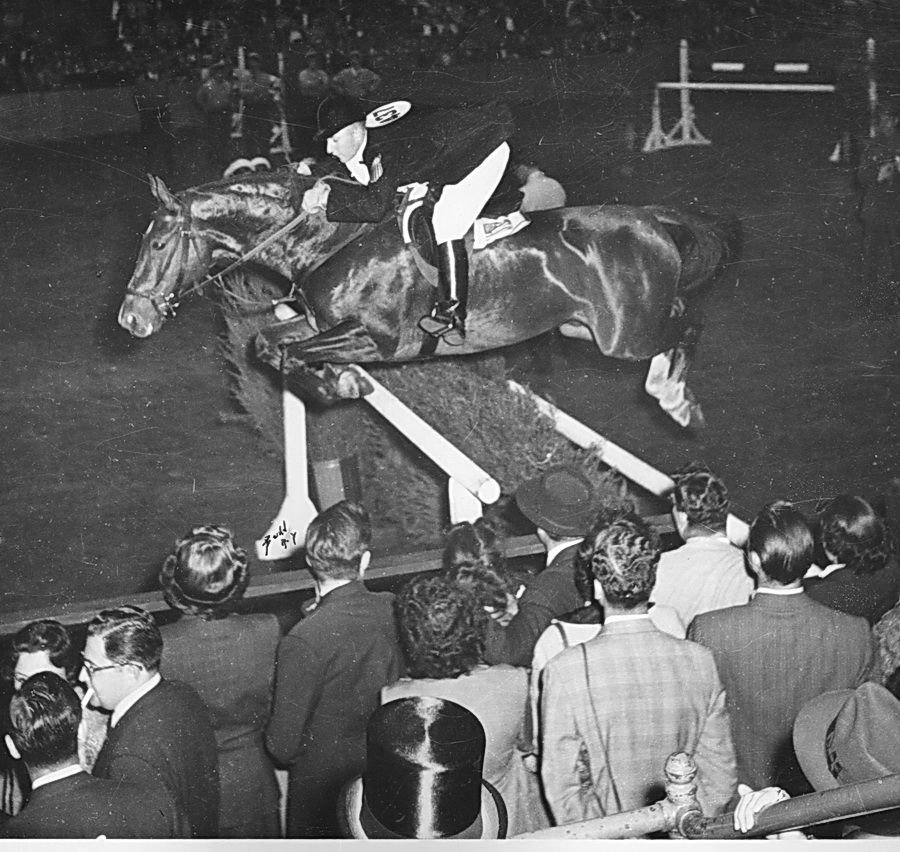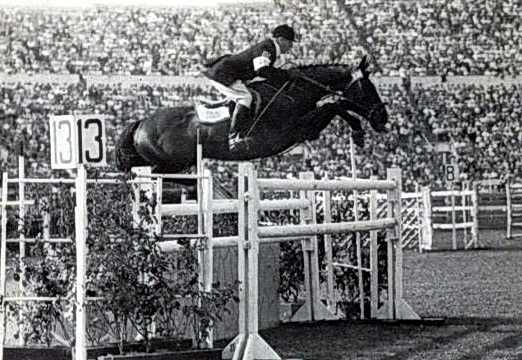The colonel, a show jumper, was the first non-German to win the Hamburg Derby–doing it on the American-bred quarter horse, Rattler–and rode on the U.S. bronze medal team at the Helsinki Olympics in 1952.
He also was part of the team that took the Nations Cups in Lucerne, Switzerland, and Dublin. As an individual, he won the puissance in Dublin, as well as the Prize of Paris in 1949.
Col. Russell eventually was put in charge of the U.S. Modern Pentathlon Training Center, serving as a mentor and inspiration to scores of athletes over 80 years.

John Russell, second from left, met at the Helsinki Olympics with Capt. Antonio Reimao and Maj. Fernando Paes of Portugal and Sgt. 1st Class Norman Brinker of the USA.
Gretchen Ornia Pacher, who owns Palermo Show Stable in Bedminster with her husband, Osvaldo, rode with Col. Russell during her junior years in San Antonio, along with her younger sister, Kate Bauer, and best friend, Gayle Cox.
His students always called their instructor “Colonel,” even though his army days were long behind him. Gretchen noted, “Colonel really never stopped teaching, he loved this sport so much that he taught as long as he could up through his final years.

Col. Russell behind the desk at his office in San Antonio.
He was, she said, “a kind man who loved our sport and all aspects of it. His teaching methods made riders think and problem-solve for themselves. One famous line in lessons was Come again,' which basically meant,`Think about the jump or exercise you just did and try it again.’ No elaborate explanations, just think and give it another try.”
Col. Russell served in World War II as a member of Gen. George Patton’s staff, selected because of his equestrian skills–you’ll remember that Patton was quite a horseman himself–and earned a Bronze Star, the Soldier’s Medal and a Purple Heart. After the war, he was named to the U.S. Olympic team for the 1948 London Games, part of the last U.S. equestrian delegation chosen from the U.S. Army. Col. Russell finished 21st in individual jumping on Air Mail.
Once the Army equestrian team was disbanded, Col. Russell was selected for the first civilian U.S. equestrian team in 1952. At the Games in Helsinki that year, he won team jumping bronze on Democrat alongside Arthur McCashin (Miss Budweiser) and Bill Steinkraus (Hollandia).

At the 1951 National Horse Show, John Russell rode the Italian thoroughbred Blue Devil to win the Royce A. Drake Memorial Challenge Trophy, donated to the show by the 1948 U.S. Army Horse Show Team. Blue Devil also evented. (Photo by Budd)
In 1956, Col. Russell became the officer in charge of the U.S. Modern Pentathlon Training Center at Fort Sam Houston,Texas. Over the subsequent decades, he coached the U.S. modern pentathlon delegations at six Olympic Games, where his athletes won six medals. His teams were also winners in the world championships. He helped organize the 1959 and 1977 World Modern Pentathlon Championships, and organized the modern pentathlon at the 1959 Pan American Games.
Olympic eventing medalist Jim Wofford, who was assigned to the pentathlon stables while he was in the Army, remembered that his father, Col. John Wofford, the first president of the U.S. Equestrian Team, was Col. Russell’s coach. In an interesting twist of fate, Col. Russell in turn became Jim’s coach.
Jim recalled that Col. Russell offered, “such an unusual mixture. His foundational riding was completely and thoroughly technically correct. And yet his training and teaching were entirely based on intuition.
“What made him special was his extraordinary ability to understand the horse’s capabilities, to understand the rider’s capabilities and to understand how to get the rider to maximize the horse’s capabilities That is not a function of keeping the straight line from the elbow to the horse’s mouth.”
Jim also cited the colonel’s “come again” technique, that helped enable riders to figure out what went wrong and how to fix it.
Even though Col. Russell was no longer in the service when Jim was riding for him, he still had the clout of a commanding officer, “because whatever he said around the stables went.”
Gretchen recalled Col. Russell as “a friendly man who loved conversation. He and my father, Dr. Charles Bauer, would have lengthy conversations even after we were no longer clients. We often visited Colonel when we’d all go home to Texas for Thanksgiving. He was always interested in the horses Osvaldo and I would find in Argentina.
“In a sense, I can thank Colonel for my marriage. Col. Russell was the one who presented the invitation to my sister for the international junior jumper competition where Osvaldo and I met.
“Colonel was a phenomenal rider himself. Apart from being an Olympic medalist, he was a stylish rider with a knack for winning.
“There are thousands of stories about Col. Russell. He touched so many people’s lives, not only the riders he taught, but their families as well. He will be remembered as a wonderful and hard-working man who lived a full and productive life.” Due to Covid, there currently is not a planned service. He will be laid to rest at Ft. Sam Houston National Cemetery with family present.
“Next time I visit my father’s grave there, I will definitely stop and pay my respects to this very important man in my life. I look forward to an announcement of a celebration of his life in the future. I’m sure his friends and family will do one, once we can all gather again.”

Col. Russell on Democrat at the 1952 Olympics.
Col. Russell received many awards in recognition of his importance to the sport, including the Pegasus Medal of Honor from the U.S. Equestrian Federation and the Gold Medal of Honor from the UIPM, modern pentathlon’s international federation. He was inducted into the U.S. Show Jumping Hall of Fame in 2001 and the San Antonio Sports Hall of Fame in 2012. He received a Lifetime Achievement Award from the FEI in 2010.
After retiring from coaching, he ran the Russell Equestrian Center in San Antonio, where his sons carried on his legacy and trained the next generation of champions.
In lieu of flowers, donations may be made to the U.S. Equestrian Team Foundation or USA Modern Pentathlon.
British sailor Jasper Blackall, also 100, is now the oldest living Olympic medalist.




